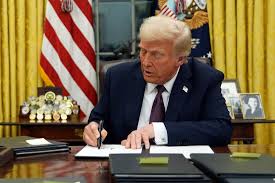Climate Politics
Defunding the Energy Transition
The President Proposes Deep Cuts to Climate and Clean Energy Spending for FY 2026
On May 2nd, the White House released what is generally referred to as a “skinny” budget request outlining priorities for discretionary spending for fiscal year 2026. A full federal budget proposal is expected later this month. The “skinny” budget contains, by the White House’s calculations, $163 billion in non-defense discretionary spending cuts, which it argues …
Continue reading “Defunding the Energy Transition”
CONTINUE READINGHow to Lie with Percentages
It’s easy to make something seem big or small, depending on how you present the numbers.
We’re told that a given policy will only reduce U.S. emissions by something like 1%, which sounds trivial. But total U.S. carbon emissions are 4.8 billion tons. One percent of that is 48 million tons, which is a lot of carbon. At the current estimate of the social cost of carbon, reducing U.S. emissions by 1% would prevent $9 billion of harm.
CONTINUE READINGWhy I Still ♥ IRA
Biden’s climate law has already had a dramatic impact.
With over a half-trillion dollars in clean tech investment to date, the Inflation Reduction Act has left an indelible mark on U.S. climate policy. It’s unlikely that Congress will vote to repeal the whole law, given massive investments in GOP congressional districts. But even if they did, there’s no undoing the investments already made.
CONTINUE READINGA Trumped-Up Energy Emergency
We have weathered past threats to energy security through democratic processes, not by executive fiat.
The Executive Order has fabricated an energy emergency and is doubly wrongheaded. First, as the statistics bear out, there is neither a domestic energy emergency nor an energy crisis. The U.S. has effectively secured energy independence. More significantly, Trump’s politically driven, fossil fuel-dependent energy portfolio is neither diversified nor economically sound.
CONTINUE READINGTalking Climate Policy with an Energy Economist
An interview with leading energy expert Catherine Wolfram
Catherine Wolfram, a leading energy economist who has researched the impact of the Inflation Reduction Act, shares her views of the impact of the IRA, its likely fate, and the energy policies of the incoming Trump Administration. Wolfram served as the Deputy Assistant Secretary for Climate and Energy Economics at the US Treasury in 2021-2022
CONTINUE READINGA Crisis in Climate Communications
Deadly windstorms, wildfires, and hurricanes constitute something more horrific than just “climate change.”
What’s best for communicating urgency: phrases like “global warming” and “climate change” or “climate crisis” and “climate emergency”? What do audiences take away from these semantic choices? Does it matter what words we use? What about when the entire nation is watching a series of wildfires engulf Los Angeles, fueled by unusually dry vegetation during …
Continue reading “A Crisis in Climate Communications”
CONTINUE READINGLooking Ahead to the Second Trump Administration
Does the IRA have staying power?
This is the seventh in a series of posts. The first post is here. The second post is here. The third post is here. The fourth post is here. The fifth post is here. The sixth post is here. The incoming Trump Administration has, of course, called for ending efforts to reduce greenhouse gas emissions, …
Continue reading “Looking Ahead to the Second Trump Administration”
CONTINUE READINGBroadening the Scope of Climate Policy
How to expand climate policy to new places and new sectors
This is the sixth in a series of posts. The first post is here. The second post is here. The third post is here. The fourth post is here. The fifth post is here. The political dynamics of decarbonization that I’ve sketched out are very specific to time, space, and economic sector. The policy approaches …
Continue reading “Broadening the Scope of Climate Policy”
CONTINUE READINGHow to Commit to Decarbonization
Feedback effects can lock in decarbonization policies, for better and for worse
This is the fifth in a series of posts. The first post is here. The second post is here. The third post is here. The fourth post is here. Decarbonization is a long-term challenge, and it requires commitments to drive the investments required for innovation and deployment of non-fossil-fuel energy sources. But long-term commitments, which …
Continue reading “How to Commit to Decarbonization”
CONTINUE READINGOn Carbon Pricing and Mass Climate Movements
Neither carbon pricing nor a mass climate movement can drive effective climate policy on their own
This is the fourth in a series of posts. The first post is here. The second post is here. The third post is here. What lessons can we draw from this analysis for key climate policy debates? Here, I will focus on two key lessons, first for carbon pricing, and second for the use of …
Continue reading “On Carbon Pricing and Mass Climate Movements”
CONTINUE READING







